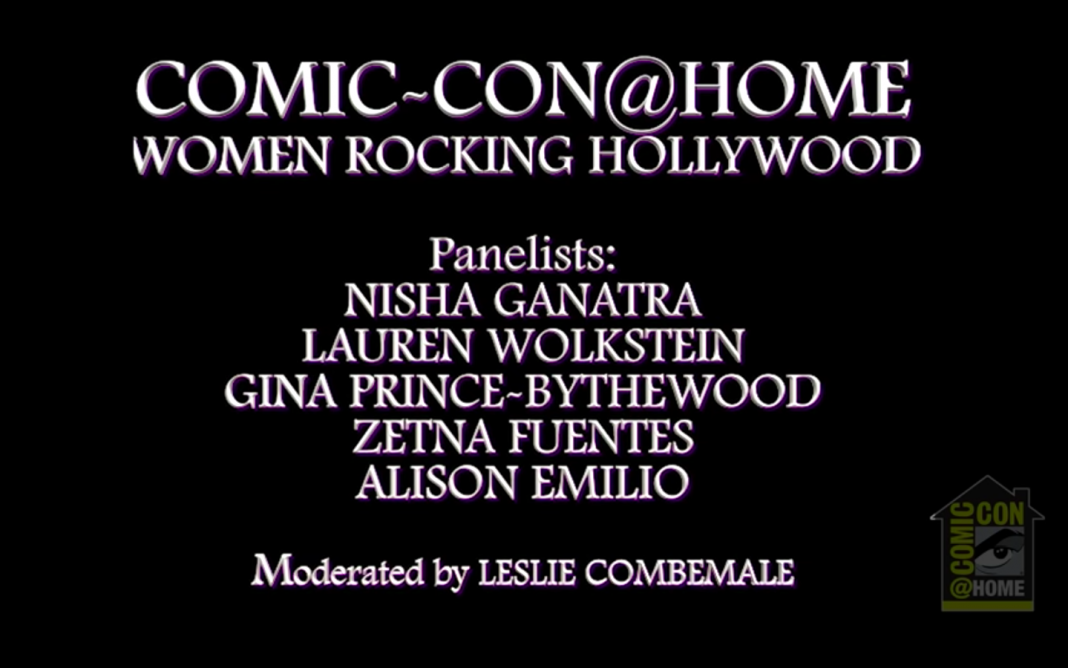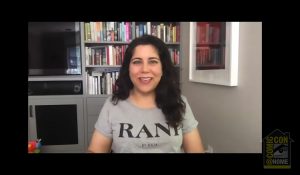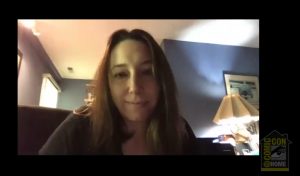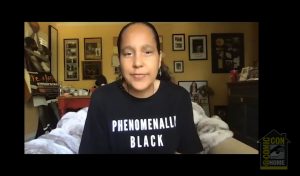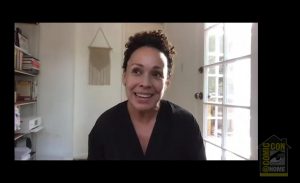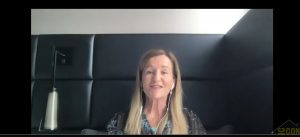There is nothing that women can’t do when we’re determined. Unfortunately women — particularly Women of Color — have always had to fight to prove our worth and capabilities. In Hollywood women face discrimination in all its dehumanizing forms, whether it’s racism, misogyny, sexism, ageism, or dismissiveness. For women wanting to create impressions of and on the world as artists, there always seems to be one obstacle after the other. Despite the multitude of challenges they face, they keep pressing towards the mark they want to make. Female filmmakers were the focus of the 2020 San Diego Comic-Con virtual Women Rocking Hollywood 2020: Supporting Female Helmed Film and TV panel, which featured directors Nisa Ganatra, Lauren Wolkstein, Gina Prince-Bythewood, Zetna Fuentes, and Alison Emilio, director of ReFrame project.
During the session moderated by Leslie Combemale, they spoke about the ways they use film to address issues affecting women in society, how they shape and tell these stories, and the changes they hope to make in the industry. First to speak was director of The High Note and Late Night Nisha Ganatra, who said she sees comedy as the perfect tool to address prejudices towards women, rather than shy away from them.
“To me the best comedies are taking on really strong points of view about the world, and everyday injustice and shining a light on it. So I think that’s the joy of comedy. It’s this sort of Trojan horse to kind of get [that] in, to get people thinking about seeing a movie they wouldn’t otherwise go see a movie about.”
As strongly as she feels about female representation on screen, Ganatra feels that way about it behind the camera as well. With The High Note, Ganatra employed women to work as heads of the departments for the film’s production, including costume designer Jenny Eagan, composer Amie Doherty, production designer Theresa Guleserian, set designer Melissa M. Levander, and many others.
“For my first indie film, I just wanted as many women behind the camera as possible because it felt like there’s always this Catch-22 where you can’t do the job until you’ve done the job, and I just thought on Chutney Popcorn like I’m giving myself this big break. I’m letting myself direct my first feature, so let me just hire all these different women who need their breaks, and what I found was, like, a whole bunch of women being gaffers, but nobody would let them be DP, or they were electrics but nobody would let them gaff. So we just kind of took everybody with tons of experience, and just bumped them all up to the job they really wanted.”
Inspired by her experiences on the set of Ava DuVernay‘s drama series Queen Sugar, on which she works as the producing director, Lauren Wolkstein strives to make every set she’s in charge of one that fosters a spirit of collaboration and female solidarity.
“What’s so wonderful about the show is that Ava only hires first-time female directors that haven’t done television before for every episode, because she saw that if you can really direct features, you can direct television. There really wasn’t this…it was really hard to get women to direct television that hadn’t already done it. And so, by having Queen Sugar as this great opportunity for women to get into television, it’s really opened up so many doors for me.
“Every show that I’ve done since then is because of Queen Sugar. So when I got the call to come back to Queen Sugar, I jumped at the opportunity because it’s such a nurturing environment. Everyone’s so wonderful. It’s kind of like going back to a family reunion with everyone there, and I try to bring everything I’ve learned from working on Queen Sugar to every set that I go on now when I’m directing, because it’s just such a wonderful collaboration between the entire cast and crew. Everyone respects everyone on the level of collaborator, and it’s just so wonderful to be a part of that experience.”
Following Wolkstein was Gina Prince-Bythewood who’s currently enjoying the international success of her first action film The Old Guard, starring Charlize Theron and Kiki Layne. In choosing to work on the project, the extensive world-building writers Leandro Fernandez and Greg Ruka (who wrote the script for the film), and the female characters, were the deciding factors. For Prince-Bythewood, the opportunity of bringing the character of Nile (Layne) a Black woman, to life was exciting because they’re so rare in the action genre.
With The Old Guard, Prince-Bythewood is the first Black female director to direct an action film. For there to still be so many firsts for Black creatives in the film industry…in 2020, is not only ridiculous, but exposes that the road to progress and equality is still an extremely long one. The idea that women can’t make action films has always been an unfair bias that hampers many women from advancing, and prevents great stories from being told.
“I love action films,” Prince-Bythewood said. “I see them all the time, and so I hate this narrative that’s in Hollywood that we don’t have a desire to shoot action. So it was exciting for the opportunity. I love that this film has so many cool set pieces, and for me I wanted each one to have a different feel. We’re also dealing with the old guard who you know are many years old, and so at times they fight with archaic weapons, and how can we make it believable that the archaic weapons can defeat modern weaponry, so to be able to weave that narrative through. But also, again we have two female leads, and I want you to believe it. I want you to believe these women can kick ass.
“It was important in the early conversations that with both Charlize and Kiki, I don’t want to use a bunch of stunt doubles, I want you guys up on-screen because I feel the best action scenes one, have a story to them, but two, are character driven and I need to see your faces, I need to see you guys doing the work, and to be able to tell that story. So it was a great collaboration with them, but also I had an incredible stunt team. Danny Hernandez was the fight coordinator, he created such great sequences, and the collaboration was great. I’ve heard horror stories of women bumping up against their stunt teams, but I had a great group of guys that gave me the utmost respect, heard me and I think it’s helpful that I kickboxed for a couple years, so do know about fighting and what looks good, and it was fun.”
Just as important as having an environment that provides opportunities for women, representation for actors of various racial and ethnic backgrounds is also important for Hollywood to become a place of true inclusiveness. Directors like Zetna Fuentes are using their positions to provide opportunities for Actors of Color from around the world to have their talents be recognized, as she did with her latest project, the supernatural fantasy series Cursed.
As the pilot director and EP, Fuentes wanted to be involved in every aspect of the creation of the series, from the decision of what camera lens would be used, the color palette, how to build the fantastical world the characters would be inhabiting, setting the tone, and also how the characters would look on-screen. With casting, she agonized over making the right choice for each role, and with a fantasy show she saw the opportunity to cast People of Color, which isn’t common in the genre.
“In casting, which is, you know, a huge component, me working with actors is my favorite part of the process, and so, you know I take that so seriously, and I agonize. You watch tapes, and you have sessions, and you go in the room and you meet incredible actors.
“You think about the qualities that they need to inhabit this role…and they’re so layered, and so for me it was about finding the best person for the job, and in a fantasy world where a lot of times we don’t see a lot of People of Color, how exciting that we could do that, you know? We could see ourselves in these roles. We can have an Arthur. We can have anyone. We can really just push for the best actor.”
For women to become successful in the film and television industry, representation has to be made a priority. Actually giving women the chance to have their voices heard through the lens of the camera, and words spoken through a script. Their perspectives have to matter, and Alison Emilio, director of the ReFrame Project, and her partners are making sure that is a reality by offering development support and mentor ship. In partnership with Hulu, ReFrame has created the ReFrame Rise program.
“ReFrame Rise is one of three core initiative programs that ReFrame runs. The intention and goal of ReFrame Rise is to […] narrow that huge set of amazing talented women, down to eight final directors, and Zetna is one of them, and we will support her work and the other seven directors for two years, we extended that because of COVID.
“We will provide professional development support, a network of three or four sponsors. Each director has three to four high-level influencers like Paul Feig, or Sarah Shepherd who runs Disney+, Robert Kessel at Participant. We match the directors, and we help [them] take their goals to the next level. And this could be their own show. Their own pilot, Marvel action movie…whatever their goal is, it’s time for us to help level them up.”
There are many creatives looking for the opportunity for the world to see what they’re capable of. Representation cannot be just a word used without any action. People have to put their money behind their words so we can have more women like Gina, Nisha, Lauren and Zetna rocking Hollywood.
The Old Guard and Cursed are currently streaming on Netflix.
Miss any of our other SDCC 2020 coverage? Click here for much more!


